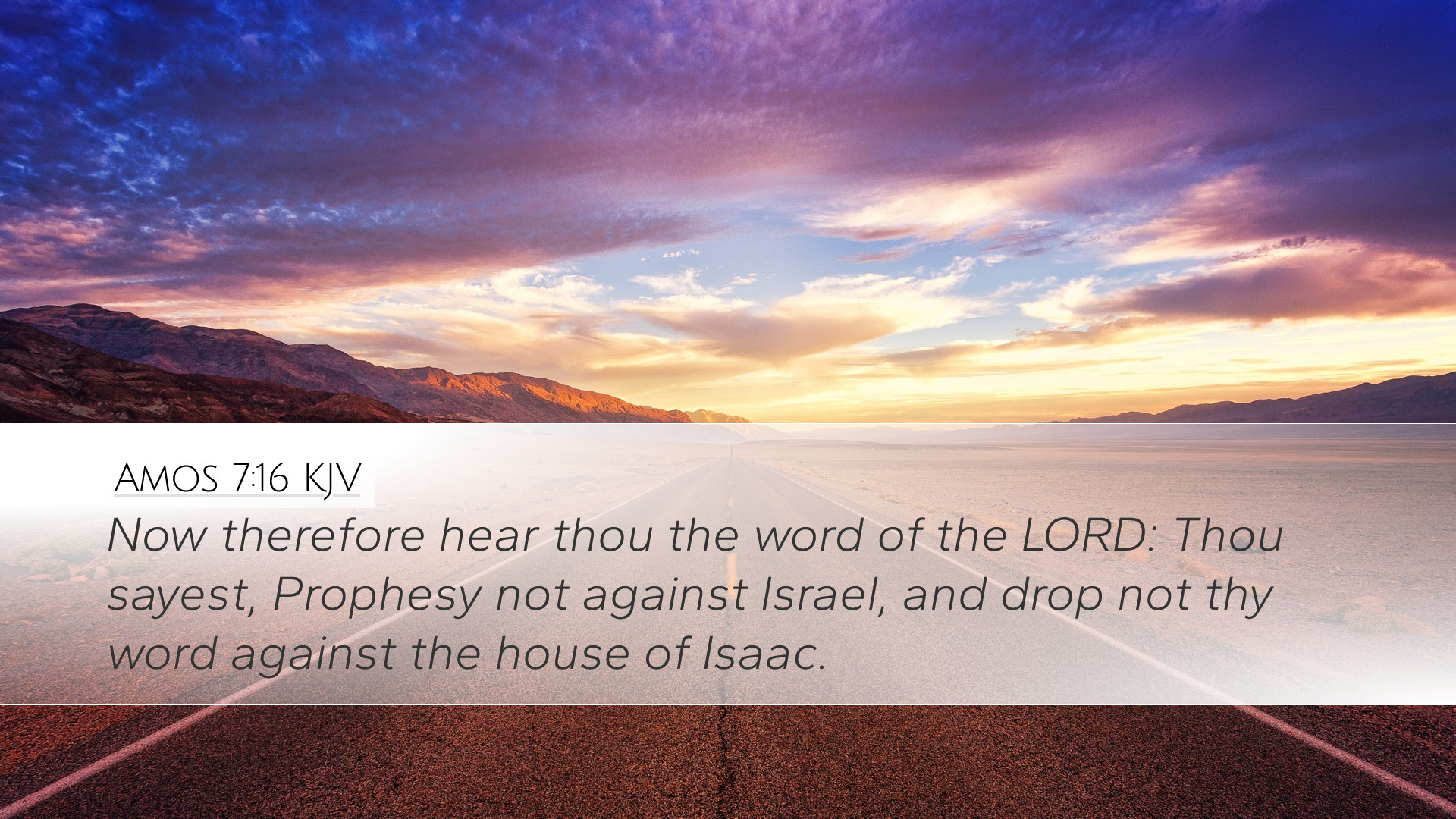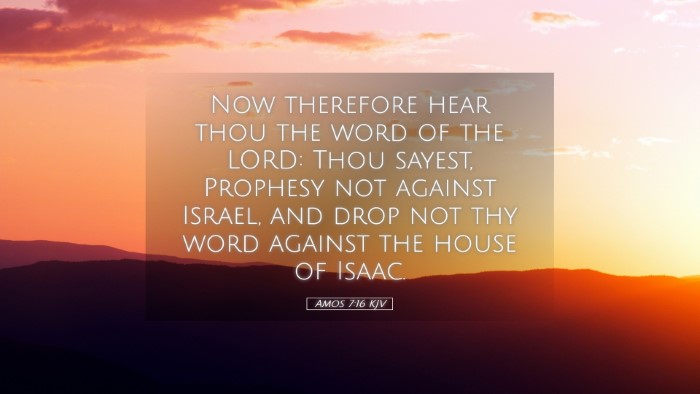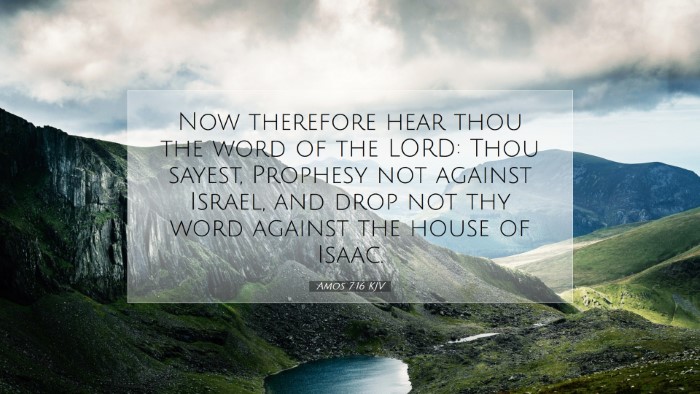Old Testament
Genesis Exodus Leviticus Numbers Deuteronomy Joshua Judges Ruth 1 Samuel 2 Samuel 1 Kings 2 Kings 1 Chronicles 2 Chronicles Ezra Nehemiah Esther Job Psalms Proverbs Ecclesiastes Song of Solomon Isaiah Jeremiah Lamentations Ezekiel Daniel Hosea Joel Amos Obadiah Jonah Micah Nahum Habakkuk Zephaniah Haggai Zechariah MalachiAmos 7:16
Amos 7:16 KJV
Now therefore hear thou the word of the LORD: Thou sayest, Prophesy not against Israel, and drop not thy word against the house of Isaac.
Amos 7:16 Bible Commentary
Commentary on Amos 7:16
Amos 7:16 states: "Now therefore hear thou the word of the Lord: Thou sayest, Prophesy not against Israel, and drop not thy word against the house of Isaac." This verse is a profound illustration of the tensions faced by prophets in delivering God’s messages, particularly when they counter popular sentiment.
Context of the Passage
This verse occurs within a broader context in which Amos, a shepherd and fig farmer from Tekoa, was called by God to deliver His messages to Israel. The prophetic ministry of Amos, occurring during a time of relative prosperity for the northern kingdom, revealed significant moral and social decay. Therefore, his message was not only unwelcome but also dangerous.
Insights from Public Domain Commentaries
Matthew Henry’s Commentary
Matthew Henry underscores the resistance faced by the prophet Amos, pointing out that the chief priest Amaziah attempts to silence him. According to Henry, this reflects a common theme in prophetic literature where prophets are often dismissed by those in power. He states:
“It is never safe to oppose the word of the Lord, which is a fire that purifies and a hammer that breaks the rock.”
Henry emphasizes the importance of listening to divine correction, suggesting that Amaziah's attempt to suppress Amos' prophecy merely showcased the spiritual blindness of Israel:
- Resistance to God’s Word: The verse highlights a fundamental issue within Israel: the refusal to accept divine admonition, which leads to impending judgment.
- The Role of the Prophet: Henry notes that the prophet’s role is not to please the people but to communicate God’s truth, regardless of its reception.
Albert Barnes’ Notes on the Bible
Albert Barnes expands upon the idea of prophetic authority in his commentary. He argues that Amos, as a prophet, carries a divine mandate that transcends human authority:
“Every prophet speaks, not of himself but in the name and by the authority of God, hence he bears no responsibility for how his message is received.”
Barnes illustrates the clash between divine authority and human opposition, elaborating on key themes:
- Authority of the Prophet: The rejection of Amos' voice signifies a rejection of God's authority. This dismissal serves as a warning to all societies that ignore divine instruction.
- Societal Implications: Barnes stresses the socio-political ramifications of ignoring prophetic messages, suggesting that the integrity of a society is intrinsically linked to its reception of God’s Word.
Adam Clarke’s Commentary
Adam Clarke provides a detailed examination of the cultural and theological implications of this confrontation. He notes that the phrase "Prophesy not against Israel" demonstrates a desire for complacency among the Israelites:
“The people preferred falsehood to truth, desiring a prophet who would endorse their infidelity rather than call them to repentance.”
From his perspective, Clarke offers keen insights on the themes of prophetic integrity and social responsibility:
- Call to Repentance: Clarke emphasizes that true prophets are called not merely to predict the future but to guide the people toward repentance and renewal of covenant with God.
- Impact of Prophetic Silence: He warns that closing one’s ears to God’s messengers invites calamity upon a nation, as spiritual fidelity is critical for communal well-being.
Theological Reflections
The message of Amos 7:16 evokes profound theological themes relevant to contemporary readers, including:
- Authority of Scripture: The verse highlights the continuous relevance of prophetic messages today. Believers are encouraged to heed God’s voice amidst societal pressures that might promote silence on moral and ethical truths.
- Human Resistance: The tendency to resist uncomfortable truths remains a significant challenge within the church and society at large. Pastoral leaders must strive to be voices of truth in a world often eager for affirmation rather than confrontation.
- The Cost of Prophecy: The calling of a prophet can come at a high personal cost. This reality can encourage aspiring leaders and theologians to be steadfast in their commitment to truth, regardless of the consequences.
Conclusion
Amos 7:16 resonates deeply within the frameworks of pastoral counseling, societal ethics, and prophetic ministry. The insights drawn from the commentaries of Matthew Henry, Albert Barnes, and Adam Clarke present a composite understanding that emphasizes the importance of listening to God’s word, the courage required to speak truth, and the collective responsibility of the faithful community. Engaging deeply with this passage can inspire modern believers to remain vigilant in their spiritual walk, promoting a culture of responsiveness to God's voice amidst contemporary challenges.


